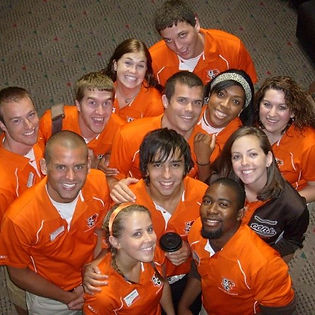CLAIRE
HOOVER
Advising and Helping
The Advising and Helping competency area addresses the knowledge, skills, and attitudes related to providing counseling and advising support, direction, feedback, critique, referral, and guidance to individuals and groups.
CSP 6020: Theory and Assessment of College Student Development
CSP 6030: Theory and Assessment of Educational Environments
CSP 6035: Multicultural Competence in Student Affairs
COUN 6760: Counseling in the Culturally Diverse
REHB 6750: Alcohol and Drug Abuse Counseling
Associated
Coursework
As an academic advisor at Owens Community College I interact with about eight students one-on-one and face-to-face during a normal work day. This means that I am responsible for the academic and emotional well-being of 24 students per work-week while also attending to emails, online chat, and phone calls. To ensure that I am providing students with information that is supportive to their academic and personal growth, I establish rapport with students by making the environment welcoming and comfortable. I do this by asking questions facilitated by the College Student Inventory, an assessment that helps me to “appropriately mentor students” (ACPA & NASPA, 2010, p. 6). I also establish rapport by gaining trust through maintaining “an appropriate degree of confidentiality” through our Banner Software (ACPA & NASPA, 2010, p. 6). I actively seek ways to improve upon these skills, and assess the effectiveness of the skills I have now through an advising survey that I send to students with whom have had face-to-face appointments. Results indicate that I create a comfortable environment and provide students with the information they were seeking. These results indicate that I exhibit active listening skills to ensure I am helping students in areas they want and need help (link to handouts created with narrative). I also seek opportunities to expand my knowledge and skills for helping students by attending the National Academic Advisor Association’s (NACADA) Regional Conference and gaining information on advising strategies and skills that I am implementing into practice. (ACPA & NASPA, 2010).
Through my coursework in both COUN 6760: Counseling in the Culturally Diverse and CSP 6035: Multicultural Competence in Student Affairs I have gained skills in counseling diverse populations, while learning to recognize the strengths and limitations of my worldview (ACPA & NASPA, 2010). COUN 6760: Counseling in the Culturally Diverse, CSP 6035: Multicultural Competence in Student Affairs, as well as my background in psychology, have helped me to “demonstrate culturally appropriate advising, helping, coaching, and counseling strategies” (ACPA & NASPA, 2010, p. 7), while also being able to “perceive and analyze unspoken dynamics in a group setting” (ACPA & NASPA, 2010, p. 6). This knowledge and skill is shown through my Voice Project , Immersion Project, Cultural Immersion Experience, presentation on counseling older adults, and Critical Reflections.
My background in psychology as well as the knowledge I have gained through the two counseling courses I have taken, aid in my ability to “provide effective counseling services to individuals or groups” (ACPA & NASPA, 2010, p. 7). By using the College Student Inventory I am able to identify students’ areas of strength and weakness, while also identifying if they have an emotional support system, and want to receive counseling services. Based upon conversations I have with students facilitated by the CSI, I have had to “consult with mental health professionals as appropriate” as well as “collaborate with other campus departments … to address health concerns in a comprehensives, collaborative way” (ACPA & NASPA, 2010, p. 7). Two particular incidents showcase my advising and counseling skills. One incident required a referral to an outside agency, showcasing my ability to “develop liaisons with community mental health providers” (ACPA & NASPA, 2010, p. 7), being in contact with student conduct regarding the situation which showed my ability to “collaborate with other campus departments” (ACPA & NASPA, 2010, p. 7), while also providing “advocacy services for survivors of interpersonal violence” (ACPA & NASPA, 2010, p. 7). The other incident, a crisis through our online chat system (link to narrative) required me to “exercise institutional crisis intervention skills and coordinate crisis intervention and responses processes” (ACPA & NASPA, 2010, p. 7), “collaborate with other campus departments” (ACPA & NASPA, 2010, p. 7), and “utilize technology to address students’ mental health issues” (ACPA & NASPA, 2010, p. 7). I have also gained skills in exercising institutional crisis intervention skills through our one-day nonviolent crisis intervention training workshop. These skills have helped me to intervene before a situation turns into a crisis, specifically with a veteran student who had negative experiences with past advisors (link to narrative).
